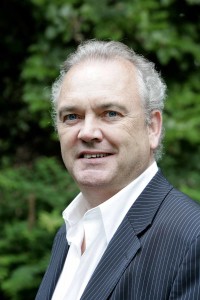Oliver Hughes — We’re good, but we could be better
A Barrister by training, the LVA’s new Chairman and his cousin publican Liam Laharte set up Harty’s Brewery in 1983 – which went bust after just three years…
“I’d been to university to study law but now I was learning from the University of Life,” he laughs.
He’d thought that the Irish might ‘get’ craft beer, but that wasn’t to be for a goodly number of years yet.
So he vowed that the next time he approached it, it would be via a pub brewery so that they’d have a ‘shop window’ and be insulated from the vagaries of big brewers. Enter Stage Right, The Porterhouse chain….
In 1989 they bought a pub in Bray. This became the staging post for lots of world beers, involving as it did “a man in a van going to Belgium and bringing back a load of beer”.
The man in the van did well. In 1996 the pair opened their first pub brewery in Dublin’s Temple Bar. It didn’t stock Guinness.
“We found out years later a book had been opened by other publicans on us surviving,” recalls Oliver. The shortest bet was two days, the longest six months.
But success followed success and in 1999 The Porterhouse opened in London – still the city’s biggest bar. The Porterhouse Glasnevin came next before they moved into tapas bars and then buying Judge Roy Beans/Lillie’s Bordello which became Porterhouse Central. Some years later the New York Porterhouse was purchased.
More recently Oliver’s spirituous ambition led him to open the Dingle Distillery, the first purpose-built distillery for new whiskey in over 250 years, he says.
Dublin licensed trade faring well
Today, wearing his LVA Chairman’s hat, he agrees that the Dublin licensed trade is doing well, certainly better than the rest of the country.
“It’s true that there has been a lack of trickledown effect once you’re outside the capital,” he says, “Country pubs are suffering very badly. Again, they’ve got to establish themselves as being part of the community and not simply a provider of alcohol.”
“The days of just opening a bar and making money are gone.”
Nevertheless he believes that bars both rural and those in Dublin can expect lots of challenges ahead.
Additional challenges to factor-in include those from the anti-alcohol lobby.
“I get very annoyed with their simplistic attitude to alcohol being invariably a bad thing.”
Alcohol and health
He divides alcohol into good and bad: “Alcohol, taken in moderation, is a fantastic asset. But we have to recognise the downside of excess alcohol in relation to health; it’s all about education in drinking better.”
It’s not about stopping drinking, he stresses, it’s about drinking better.
“Irish pubs have always been responsible in their approach and we have to give customers a better experience, provide them with more knowledge about what we do. We’re good, but we could be better.
“We’ve got to reposition the Irish pub as being part of the community – it always has been, but that aspect seems to have been forgotten.”
Now that below-cost selling seems to have been so firmly ruled out by Health Minister Leo Varadkar, what’s the Association’s stance on Minimum Unit Pricing?
“Our members would be very happy with MUP,” he answers, “As was explained to me by another publican recently, a can of lager in 1979 was €1.30 (£1); 35 years later you can buy it for 80 cent. It’s not responsible to allow places sell beer cheaper than water.
“But simply taxing it is not a solution either therefore MUP is a sensible approach. Again I believe that and we should be taught to drink less and drink better. We also have to attempt to curb binge-drinking and educate people that it’s not good for society.”
Pubs and tourism
As incoming Chairman he’ll be involved in moves towards a national licensed trade organisation.
“That’s up to the decision of our members but whether it happens or not, we have to be better-positioned to explain the essence of the pub trade.
“The world has a respect for the Irish pub which is not necessarily respected by our own,” he believes, “We have to respond to that challenge and recognise the fact that the world’s tourists come to Ireland primarily for our hospitality and we’re the key to unlocking that potential which is a huge benefit to the Irish economy.”
There’s little doubt that problems continue to beset a licensed trade finding itself subject to diminishing footfall with each passing year.
As publicans seek to counteract this, Oliver believes – no surprise here – that craft beers and premium whiskeys could well provide the answer. And he doughtily defends his reasoning: “If you buy a Maserati it’s because you believe it’s the best product on the road or you wouldn’t invest in it in the first place!”.

“The world has a respect for the Irish pub which is not necessarily respected by our own” – the Chairman speaks.
Soft drinks and overheads
Soft drinks pricing policy in the on-trade often seems to counteract attempts to increase pub footfall – a subject that’s simply been avoided by the licensed trade over the years. However Oliver’s happy to redress this.
“Soft drinks are expensive,” he agrees, “But it’s not simply about the cost of the soft drink itself, it’s about the atmosphere and the ambience we create in our establishments when one has a drink of any kind which doesn’t come cheaply to us either.
“At the height of the recession our rates in just one of our bars were increased from €53,000 to €155,000 – that’s in just one pub!
“On top of this we pay for bin collections and water thus our overheads have been tripled in a recession. This beggars the belief of any commercially-minded person. You need to look at what exactly these overall margins are contributing towards.”
As for the Association making any progress on getting a commercial rates re-assessment for Dublin pubs, Oliver believes that very little progress has taken place.
“It’s very little because our masters need feeding and they would appear not to be lean,” he adds darkly.
International comparisons
Having bars in Dublin, London and New York, the new LVA Chairman is in something of a unique position to provide an overview on the major differences to be found operating in the different environments.
“The margins are better in London, way better in New York and people there don’t whinge,” he comments, “They make a decision, they drink less, they drink better and they want to be entertained.
“We have a lot more control in both New York and London in respect of public order too.”
He elaborates: “You wouldn’t think twice about letting a female work on her own behind the bar in London and New York but you would not let that happen in Dublin because of the lawlessness.”
A sad indictment, surely, on our capital city from a man who’ll never be shy of stating exactly what he feels. Refreshing.








